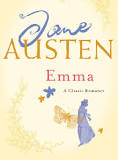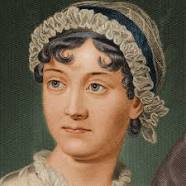Emma Page #8
Emma, by Jane Austen, is a novel about youthful hubris and the perils of misconstrued romance. The story takes place in the fictional village of Highbury and the surrounding estates of Hartfield, Randalls, and Donwell Abbey and involves the relationships among individuals in those locations consisting of "3 or 4 families in a country village". The novel was first published in December 1815 while the author was alive, with its title page listing a publication date of 1816. As in her other novels, Austen explores the concerns and difficulties of genteel women living in Georgian–Regency England; she also creates a lively comedy of manners among her characters and depicts issues of marriage, gender, age, and social status.
Emma watched her through the fluctuations of this speech, and saw no alarming symptoms of love. The young man had been the first admirer, but she trusted there was no other hold, and that there would be no serious difficulty, on Harriet's side, to oppose any friendly arrangement of her own. They met Mr. Martin the very next day, as they were walking on the Donwell road. He was on foot, and after looking very respectfully at her, looked with most unfeigned satisfaction at her companion. Emma was not sorry to have such an opportunity of survey; and walking a few yards forward, while they talked together, soon made her quick eye sufficiently acquainted with Mr. Robert Martin. His appearance was very neat, and he looked like a sensible young man, but his person had no other advantage; and when he came to be contrasted with gentlemen, she thought he must lose all the ground he had gained in Harriet's inclination. Harriet was not insensible of manner; she had voluntarily noticed her father's gentleness with admiration as well as wonder. Mr. Martin looked as if he did not know what manner was. They remained but a few minutes together, as Miss Woodhouse must not be kept waiting; and Harriet then came running to her with a smiling face, and in a flutter of spirits, which Miss Woodhouse hoped very soon to compose. “Only think of our happening to meet him!--How very odd! It was quite a chance, he said, that he had not gone round by Randalls. He did not think we ever walked this road. He thought we walked towards Randalls most days. He has not been able to get the Romance of the Forest yet. He was so busy the last time he was at Kingston that he quite forgot it, but he goes again to-morrow. So very odd we should happen to meet! Well, Miss Woodhouse, is he like what you expected? What do you think of him? Do you think him so very plain?” “He is very plain, undoubtedly--remarkably plain:--but that is nothing compared with his entire want of gentility. I had no right to expect much, and I did not expect much; but I had no idea that he could be so very clownish, so totally without air. I had imagined him, I confess, a degree or two nearer gentility.” “To be sure,” said Harriet, in a mortified voice, “he is not so genteel as real gentlemen.” “I think, Harriet, since your acquaintance with us, you have been repeatedly in the company of some such very real gentlemen, that you must yourself be struck with the difference in Mr. Martin. At Hartfield, you have had very good specimens of well educated, well bred men. I should be surprized if, after seeing them, you could be in company with Mr. Martin again without perceiving him to be a very inferior creature--and rather wondering at yourself for having ever thought him at all agreeable before. Do not you begin to feel that now? Were not you struck? I am sure you must have been struck by his awkward look and abrupt manner, and the uncouthness of a voice which I heard to be wholly unmodulated as I stood here.” “Certainly, he is not like Mr. Knightley. He has not such a fine air and way of walking as Mr. Knightley. I see the difference plain enough. But Mr. Knightley is so very fine a man!” “Mr. Knightley's air is so remarkably good that it is not fair to compare Mr. Martin with him. You might not see one in a hundred with gentleman so plainly written as in Mr. Knightley. But he is not the only gentleman you have been lately used to. What say you to Mr. Weston and Mr. Elton? Compare Mr. Martin with either of them. Compare their manner of carrying themselves; of walking; of speaking; of being silent. You must see the difference.” “Oh yes!--there is a great difference. But Mr. Weston is almost an old man. Mr. Weston must be between forty and fifty.” “Which makes his good manners the more valuable. The older a person grows, Harriet, the more important it is that their manners should not be bad; the more glaring and disgusting any loudness, or coarseness, or awkwardness becomes. What is passable in youth is detestable in later age. Mr. Martin is now awkward and abrupt; what will he be at Mr. Weston's time of life?” “There is no saying, indeed,” replied Harriet rather solemnly. “But there may be pretty good guessing. He will be a completely gross, vulgar farmer, totally inattentive to appearances, and thinking of nothing but profit and loss.” “Will he, indeed? That will be very bad.” “How much his business engrosses him already is very plain from the circumstance of his forgetting to inquire for the book you recommended. He was a great deal too full of the market to think of any thing else--which is just as it should be, for a thriving man. What has he to do with books? And I have no doubt that he will thrive, and be a very rich man in time--and his being illiterate and coarse need not disturb us.” “I wonder he did not remember the book”--was all Harriet's answer, and spoken with a degree of grave displeasure which Emma thought might be safely left to itself. She, therefore, said no more for some time. Her next beginning was, “In one respect, perhaps, Mr. Elton's manners are superior to Mr. Knightley's or Mr. Weston's. They have more gentleness. They might be more safely held up as a pattern. There is an openness, a quickness, almost a bluntness in Mr. Weston, which every body likes in him, because there is so much good-humour with it--but that would not do to be copied. Neither would Mr. Knightley's downright, decided, commanding sort of manner, though it suits him very well; his figure, and look, and situation in life seem to allow it; but if any young man were to set about copying him, he would not be sufferable. On the contrary, I think a young man might be very safely recommended to take Mr. Elton as a model. Mr. Elton is good-humoured, cheerful, obliging, and gentle. He seems to me to be grown particularly gentle of late. I do not know whether he has any design of ingratiating himself with either of us, Harriet, by additional softness, but it strikes me that his manners are softer than they used to be. If he means any thing, it must be to please you. Did not I tell you what he said of you the other day?” She then repeated some warm personal praise which she had drawn from Mr. Elton, and now did full justice to; and Harriet blushed and smiled, and said she had always thought Mr. Elton very agreeable. Mr. Elton was the very person fixed on by Emma for driving the young farmer out of Harriet's head. She thought it would be an excellent match; and only too palpably desirable, natural, and probable, for her to have much merit in planning it. She feared it was what every body else must think of and predict. It was not likely, however, that any body should have equalled her in the date of the plan, as it had entered her brain during the very first evening of Harriet's coming to Hartfield. The longer she considered it, the greater was her sense of its expediency. Mr. Elton's situation was most suitable, quite the gentleman himself, and without low connexions; at the same time, not of any family that could fairly object to the doubtful birth of Harriet. He had a comfortable home for her, and Emma imagined a very sufficient income; for though the vicarage of Highbury was not large, he was known to have some independent property; and she thought very highly of him as a good-humoured, well-meaning, respectable young man, without any deficiency of useful understanding or knowledge of the world.
Translation
Translate and read this book in other languages:
Select another language:
- - Select -
- 简体中文 (Chinese - Simplified)
- 繁體中文 (Chinese - Traditional)
- Español (Spanish)
- Esperanto (Esperanto)
- 日本語 (Japanese)
- Português (Portuguese)
- Deutsch (German)
- العربية (Arabic)
- Français (French)
- Русский (Russian)
- ಕನ್ನಡ (Kannada)
- 한국어 (Korean)
- עברית (Hebrew)
- Gaeilge (Irish)
- Українська (Ukrainian)
- اردو (Urdu)
- Magyar (Hungarian)
- मानक हिन्दी (Hindi)
- Indonesia (Indonesian)
- Italiano (Italian)
- தமிழ் (Tamil)
- Türkçe (Turkish)
- తెలుగు (Telugu)
- ภาษาไทย (Thai)
- Tiếng Việt (Vietnamese)
- Čeština (Czech)
- Polski (Polish)
- Bahasa Indonesia (Indonesian)
- Românește (Romanian)
- Nederlands (Dutch)
- Ελληνικά (Greek)
- Latinum (Latin)
- Svenska (Swedish)
- Dansk (Danish)
- Suomi (Finnish)
- فارسی (Persian)
- ייִדיש (Yiddish)
- հայերեն (Armenian)
- Norsk (Norwegian)
- English (English)
Citation
Use the citation below to add this book to your bibliography:
Style:MLAChicagoAPA
"Emma Books." Literature.com. STANDS4 LLC, 2025. Web. 23 Feb. 2025. <https://www.literature.com/book/emma_29>.








Discuss this Emma book with the community:
Report Comment
We're doing our best to make sure our content is useful, accurate and safe.
If by any chance you spot an inappropriate comment while navigating through our website please use this form to let us know, and we'll take care of it shortly.
Attachment
You need to be logged in to favorite.
Log In